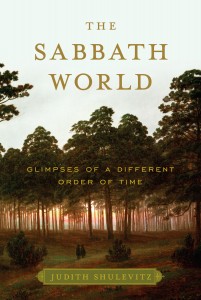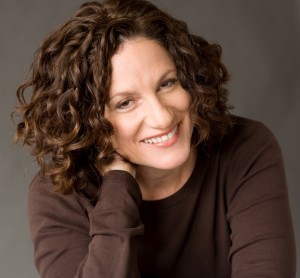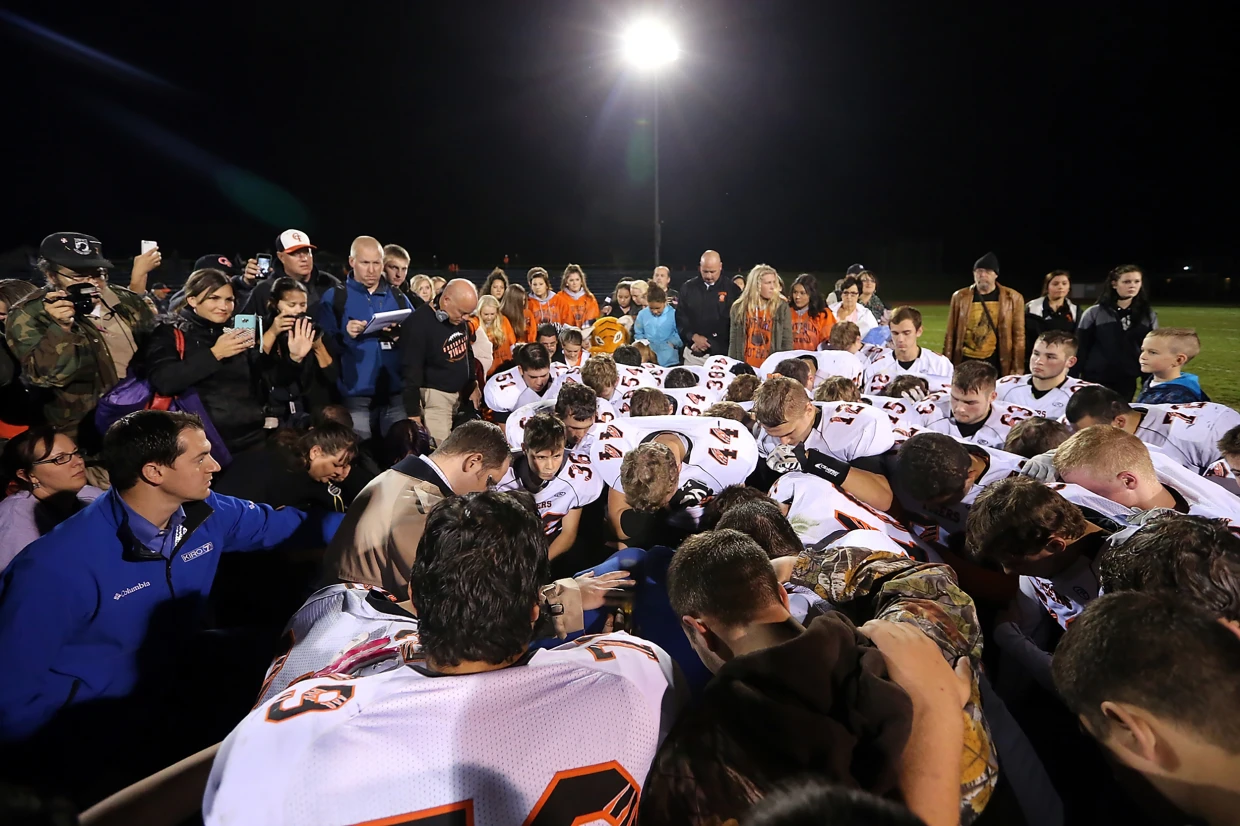Making Shabbat a part of modern life is a juggling act for many Jewish families – including my own. Author Judith Shulevitz, who I interviewed yesterday by phone, confesses to being a tad obsessed with the Sabbath. She, too, is conflicted over how far to go in observing Shabbat.
Her passion, fascination, and obsession with Shabbat resonate throughout her new book, The Sabbath World, Glimpses of a Different Order of Time. In her interview, she is candid about her callow views of her own faith as a teen and how much wiser she is today. And yet, she said she still does not how to pray. “I go through the motions.”
The book intersperses memoir with research and social theory about the Jewish Shabbat as well as other religions’ decision to anoint a day for rest. Sabbath World at times gets weighed down by the amount of research, but the author keeps readers engaged because she always returns us to her own story. The 47-year-old writer’s prose becomes the most poignant and honest when she describes her struggles with her faith. Sabbath World is a must-read for any Jew who wants to understand more about the Sabbath, one of our faith’s most important inventions, and understand more about what it means to be a Jew.
Shulevitz, a columnist for The New Republic and contributor to several other publications, lives in New York with her husband and two children, ages 6 and 8.
Below are excerpts from the interview:
Q: Throughout Sabbath World, your voice often has a sarcastic tone when you’re talking about all the rules of Judaism. And early on, you tell us that as you are about to practice Judaism, “I hear my father’s voice. It tells me that I am freer than any Jew who came before me. …. I don’t have to obey oppressive Jewish rules. Why twist freedom into a curse?” Tell me about your father and his influence on your views about Jewish ritual.
A: My father culturally is about Jewish as you can get, but he had no patience for practice. He is a rather sarcastic man, and even more so his brothers are sarcastic, and were somewhat scornful of our Jewish practices. You have to remember what it was like in the 1940s and 1950s and people who practiced these outmoded rituals were in the distinct minority in this country. People came to this country and they had shed themselves of these ancient rituals about as fast as they could.
He represented the world to me as fathers often do. In contemporary marriage, the man goes out in the world and is of the world. The woman stays home and takes care of the children. The child does not trust her as a woman of the world. She is not as exciting and worldly as fathers are. My father was more worldly and represented the world, and the world did not keep the Sabbath. I would not say he said it was nonsense. It was complicated.
Q: “I didn’t know how to pray. I still don’t.” Those are powerful lines in your book, and yet I wonder what you mean. You are a long a student of Jewish ritual and observance. You grew up hearing your mother pray. Now, you likely know the meaning of the words of the prayers and why they fit where they do in a service. How do you define prayer?
A: My husband always teases me that if you ask Judith if she grew up Jewish, she would say, ‘Oh, not at all, but to me, she’s Hasidic.’ He’s noticed that everybody does that and says, ‘Oh, my family was completely assimilated.’ …
What I mean is I don’t know how to pray. I do go to shul. I go through the motions. It does not move me that deeply. I am not really there for a prayer, though I am there for things that make up the prayer, like the music, like the poetry, like the Torah, like the congregational aspect of being together in a room.
One obstacle to becoming truly Orthodox is, ‘Could I truly daven three times a day? I’m really learning it now because I go to my children’s day school t’filah in the morning. Once a week, they open up each class to parents. There, they really train the kids. On this word you do this, on this word you do that. I think any thing you learn in childhood and you do every day becomes completely natural.
One of the reasons I don’t know how to pray is because I was not brought up praying. I went to children’s services when forced to. It was not a deeply prayerful experience for me. I stopped going after my bat mitzvah.
Q: Do we need to be taught to pray or is it something we either are wired to do or not?
A: We are wired to do it and we need to be taught to do it. Prayer is an activity. It’s an intellectually challenging activity. It involves music. It involves meditation. All of those things don’t just come naturally. You have to learn them. You can learn them by seeing other people do them. I don’t think we pray naturally. Religion is an artifact of civilization. … Everything having to do with civilization still has to be taught.
Q: You are, by your own definition a Jew who was given an abundance of opportunities to be Jewish. As a child, you did attend services. You marked your bat mitzvah. You were, as you described, a “willful, authority-baiting self” who “smoked dope behind my after-school Hebrew school… who scoffed at my parents’ Holocaust obsession and the endless pictures of dead Jews in their library.” What do you think made you so scornful of Judaism?
A: There was a moment. I was growing up in the ’70s and ’80s. There was a kneejerk, unthought-through dismissal of religion and Judaism in general. It just wasn’t cool to be Jewish when I was growing up. It was something for nerds and geeks. I was writing there from inside the head of an obtuse, callow adolescent. That’s what I thought. I was an idiot. Sue me.
Q: Many of us find our way back to Judaism because of something traumatic or significant in our lives. For me, it was losing my brother and for years trying to find something to give my life peace and balance. What brought you back to Judaism?
A: I spend the whole book not quite knowing, and I’m not sure I know now. There is a sense that my life is drifting away from me. I’m not connected to my past. I work too much. I do nothing but work. I’m a little bored by the people I’m surrounded by, the people who work with me, that cohort out of college, in the city. We all seem driven, overambitious, boring. I’m unaware of what I’m looking for. I wander back into a synagogue and it makes me cry. The way of life I was leading seemed to me shallow, disconnected, alienated, wrong, and overly driven by commercial concerns. This other way of life seemed to me oppressive, scary, connected to the past, and also connected to something more real than the life I was living.
Q: In your late 20s, you begin going to shul in Brooklyn, but did not feel like you fit in. In a hilarious line, you write about how your return to Judaism “struck me as an apprenticeship in being middle-aged.” How so?
That was a straight demographic observation. Everybody around me was married with children and I was not. The BJ (B’nai Jesurun) phenom was happening up in Manhattan. They were having enormous success with very musically oriented Friday night services aimed at young singles. When I went at a later point, I thought, ‘Oh, my god, these Jews are so young and well-dressed. Who knew? They were fashionable and handsome, the world I thought I admired at the time. I was going to a Brooklyn shul, and most of the people there were families with children.
Q: Tell us what your view is of temples now and how comfortable they are for 20-somethings and even 30-somethings who yet to have formed a family.
A: Judaism has become much hipper and much younger, at least here in New York. There is just so much going on for young people now. Now that I am middle-aged, I feel deeply out of it. I’m in Morningside Heights near Jewish Theological Seminary. There are all of these wonderful minyahim. When you are middle-aged, you are limited to synagogues that give your children something to do.
Q: Sabbath World is fascinating because of its structure. You alternate from memoir to history to social theory to even literary analysis. It is your personal story that sits with me the most, and yet as a Jew, I feel compelled to dig back into your book again and again perhaps even as something I would read on the Sabbath. It as if you have written several d’var Torahs – several riffs on scripture. What perhaps are the most important passages readers should hone in on if they truly want to understand the roots of the Sabbath?
I know it’s one of the harder core pieces where I talk about the Sabbath as a four-step program for building community. It’s important that the Sabbath has this efficacy. It’s not just about religion. It’s a brilliant form of social organization. It’s not just this Jewish thing. ..
(And, suggests Shulevitz, read her passage about Moses and the giving of the manna and his effort to form civil society through the Sabbath.)
Q: Your mother went to rabbinical school shortly after you graduated college? What effect did that have on you then – and how does it affect you now? What was your mother’s reaction to your book?
I was outwardly supportive (of my mother’s becoming a rabbi). Inwardly, I thought, ‘What? Why would you want to be a part of religion that wants nothing to do with you? Why shoehorn yourself into this patriarchal system?’ This was the 1980s. The Conservative movement started admitting women in 1985, and she was in graduate school already. [Now] I think it’s great. I know a great deal more about what it takes, and I admire it. It’s very, very hard work.
After the book was published, I imagined a family break. She was very tolerant. I didn’t show it to her until after it was published. She liked it a lot, and my Dad loved it. They did not like having their dirty laundry aired in public, but they liked the rest of the book. By the end of the book, it’s clear that it’s kind of a testimonial to my mother. I ended up taking what she pioneered. I ended up admiring the wisdom of her ways.
Q: At your reading at Smith College last week, you expressed disappointment that Sabbath World has not stirred controversy. You do, after all, in your concluding chapter push for a return to the idea of a day of rest in America for everyone, and horror of horrors, you seem open to having a national Sabbath on Saturday, Sunday or any day in seven. What aspect of your book did you think might provoke controversy?
Where I did provoke controversy was in the Seventh Day Adventist community because I hint that it’d be fine with me if [the day of rest] were Sunday. I thought the Orthodox world would be chagrined or horrified by my book. Lo and behold, they embraced it.
In the 19th century, the question of how the Sabbath should be kept and whether federal government should impose laws to require people to keep the Sabbath was one of the burning issues. It was like abortion. People fought bitterly about this. It had huge consequences. … We do not live in a time like that. It’s a very different time. It’s evident that the Sabbath is a null category for people. I do think the most difficult thought an American can think is that it’s ok for government to regulate time. Americans are so knee-jerk libertarian.
Q: What is next for you?
There are some projects I’m considering, but haven’t settled on. Do I want to write a book after this? Dare I? Yes, I do.






